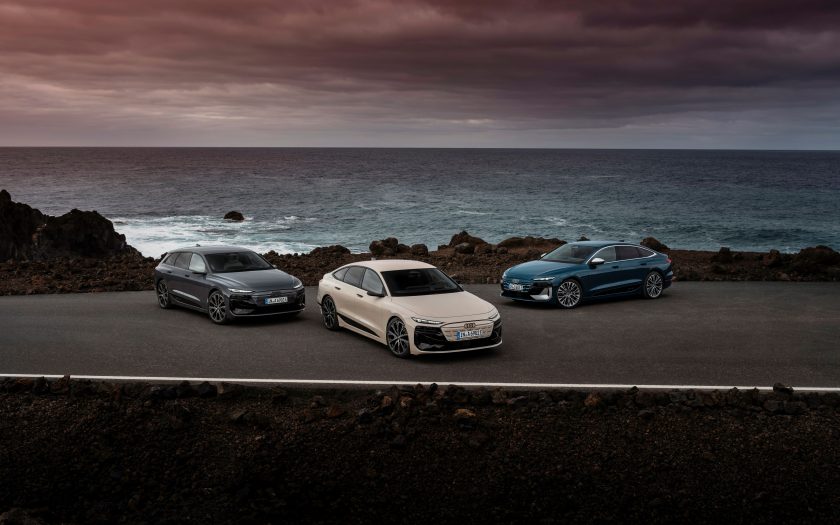THE AUDI A6 E-TRON CONCEPT debuted at the Auto Shanghai 2021 trade fair as the forerunner of an innovative family of all-electric volume models. Audi is now launching the A6 e-tron as a Sportback and Avant. As the second model on the PPE platform, the upper mid-size vehicle picks up on the familiar product strengths of performance, range, efficiency, and charging. It is also the platform’s first model with a flat floor concept. The exterior is powerful, sporty, and perfectly proportioned. Audi’s new design philosophy defines the interior. Depending on the equipment level, the A6 e-tron offers many innovative features, such as second-generation virtual exterior mirrors, a panoramic glass roof that becomes opaque at the touch of a button and illuminated rings at the rear.
“The A6 e-tron is the first purely electric Audi model available as a Sportback and Avant,” says Gernot Döllner, Chairman of the Board of Management of AUDI AG. “Its striking design enables the best aerodynamics in the portfolio and therefore greater efficiency. It will inspire enthusiasm for e-mobility with its long range of well over 700 kilometres and outstanding driving dynamics.”
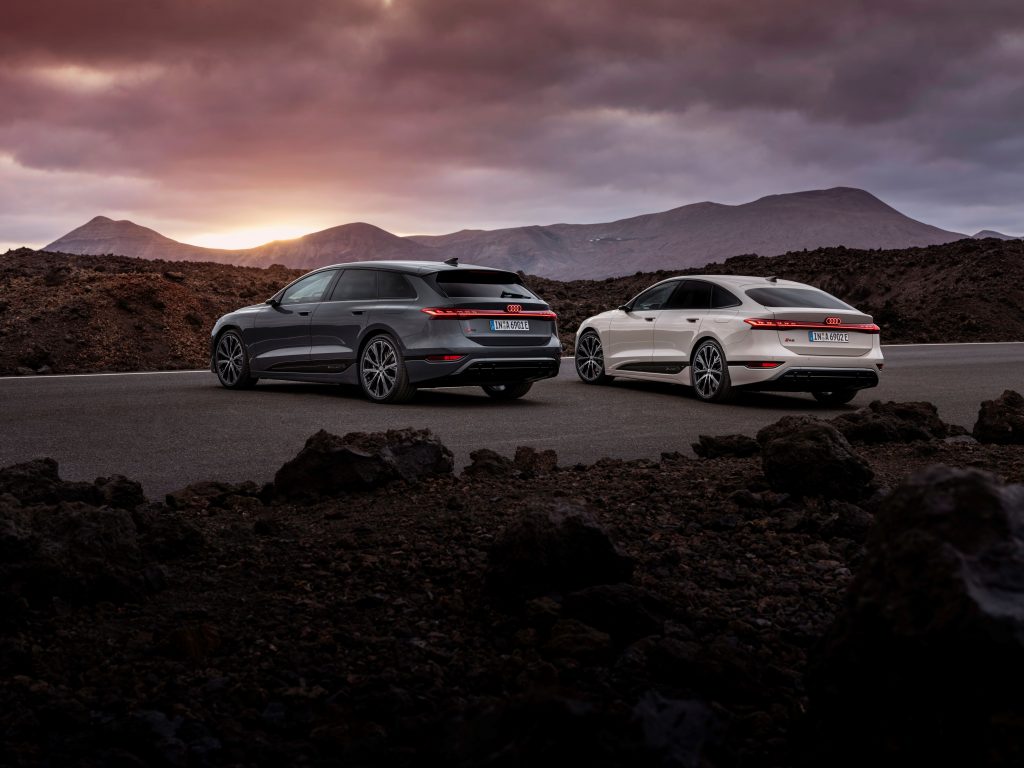
The exterior: elegant and progressive
The body’s clean design focuses on dynamism, progressiveness, and elegance. The front is simultaneously harmonious and expressive. The slim design of the daytime running lights and the wide grille make the A6 e-tron appear flat and wide on the road. A black mask surrounds the closed and inverted single frame, reflecting the distinct design language of the e-tron models. The main headlights and other functional elements, such as the Advanced Driver Assistance System (ADAS) sensors and the air intakes, are integrated into the dark mask, making them almost invisible.
The dynamic roofline of the A6 e-tron rests on a powerful foundation with a low ride height. The quattro blisters are those contours that emphasise the quattro drive with their sculptural and muscular shape. They are a core element of the Audi design DNA. As the heart of the car, the battery is emphasised by a black insert in the sill area. The insert gives the car a flat, slim, and dynamic appearance from the side. It extends to the rear and integrates the reflectors, giving the A6 e-tron a visually stretched appearance. The Avant is also characterised by a very flat roofline, with the D-pillar sloping steeply forward. An aluminium-look trim piece from the A-pillar to the roof spoiler is a new, distinctive feature of the A6 Avant e-tron and creates a high recognisability.
The rear conveys a mixture of sporty elegance and full power. The clean architecture, combined with the continuous and three-dimensional light strip, gives the new A6 e-tron clarity and aplomb. A striking spoiler lip finishes off the rear of the Sportback, and the eye-catching rear diffuser further emphasises the sporty and dynamic look of the rear.
The Audi A6 e-tron comes with 19-inch five-arm dynamic wheels, designed as aero wheels, as standard while the S line gets 20-inch “five-spoke tripod” wheels in graphite grey. The S6 e-tron comes with 20-inch wheels as standard. Stunning wheels up to 21 inches are available as an option. Nine distinctive designs – from sporty to elegant, are available, including six from
Audi Sport.
The exterior of the Audi A6 e-tron differs between the variants basic, S line and S model. Up to eight exterior colours are available at market launch, including the standard colour Magnetic grey solid as well as Glacier white metallic, Typhoon grey metallic and Mythos black metallic. They emphasise the exterior’s powerful and progressive design. Two blue shades, Plasma blue metallic and Malpelo blue metallic, are also available. Daytona grey pearl effect and Siam beige metallic are reserved exclusively for the S line variant and the S model.
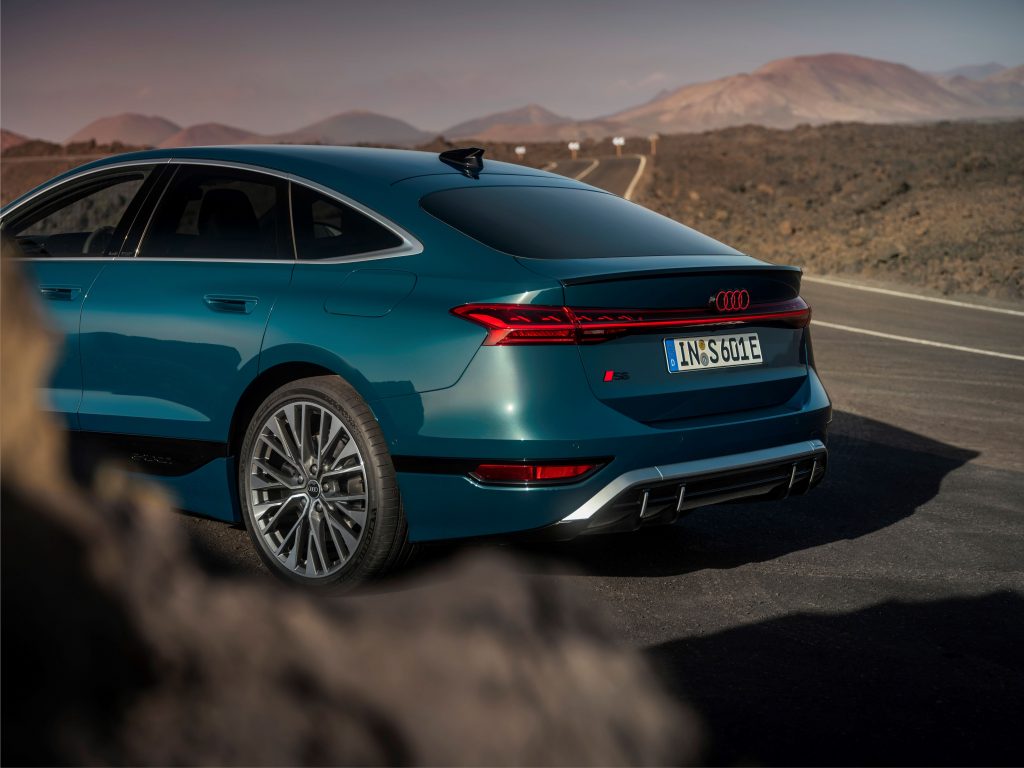
Best in class: outstanding aerodynamics
Superior aerodynamics is a core component of the long history of successes for Audi. The aerodynamic heroes of the past, such as the Audi 100 (C3) and the Audi 80 (B3), also belong to the mid-size segment.
The legendary Cd of the third-generation Audi 100 meant it was called the “aerodynamics world champion of all classes”. With a Cd of 0.30, Audi outclassed its competitors in 1982 – and continued to do so for many years. Today, the Audi A6 e-tron is writing a new chapter in this success story. The sporty design and set-up of the new Audi A6 e-tron contribute to its excellent aerodynamics and ensure an exceptionally low Cd of 0.21 for the Sportback, making it the best Audi of all time in terms of aerodynamics and the most aerodynamic vehicle in the entire VW Group. The Avant also achieves a very good Cd of 0.24, making it one of the best in its segment.
The front is aerodynamically optimised and has air curtains that positively influence the flow around the front and the wheels. The greenhouse is extremely slim, and the roofline slopes towards the rear. Moreover, a controllable cool-air intake under the Singleframe of the Audi A6 e-tron ensures the airstream can flow around this zone with minimal losses. Audi has further optimised this system with additional components. The underbody also plays a vital role in the aerodynamics concept through a high degree of sealing and small optimisations of various components. These include specially adapted wheel trims and 3D bumps ahead of the front wheels, which are individually optimised for the Sportback and Avant, the undertray, the battery, the rear axle, and sill panels. A wide and aerodynamically optimised diffuser achieves the optimum balance between lift at the rear axle and Cd. The Avant is also equipped with an additional spoiler on the diffuser. Aero elements in the form of side spoilers at the rear of the A6 Avant e-tron enable controlled stall. The low roof edge spoiler contributes to a small “still water area” behind the vehicle, which also improves the aerodynamics.
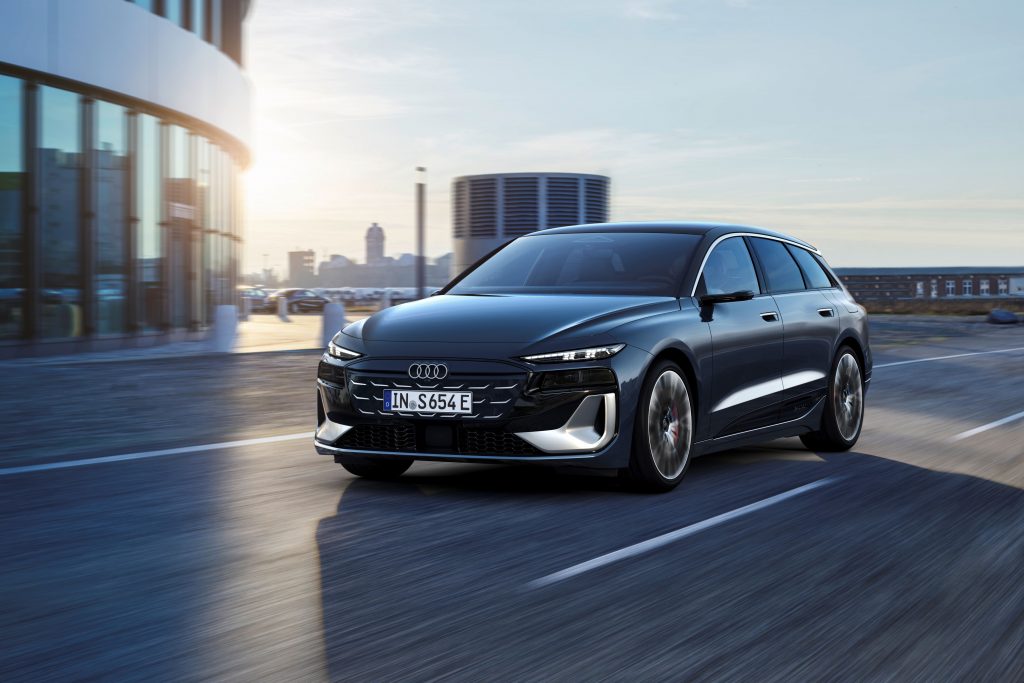
Aero optimisations offered by some of the wheels of various sizes round off the aerodynamic concept. For example, an attractive 21-inch aero wheel with plastic covers is offered. The optional virtual exterior mirrors are among the proven aerodynamic components that are already familiar from the Audi Q8 e-tron. Their second generation is used on the Audi A6 e-tron, and they can now fold electrically. The compact cameras have a flow-optimised shape, which reduces the front area of the vehicle and improves the drag coefficient.
Innovative lighting technology
With the new Audi A6 e-tron, Audi is underlining its leading role in lighting design and technology – an essential part of the Audi DNA. The headlights and rear lights have a three-dimensional design and offer digital light signatures, bringing the physical and digital worlds together. At the front, the Audi A6 e-tron family offers digital daytime running lights with LED technology as an option as well as second-generation digital OLED rear lights.
With around 45 segments per digital OLED panel, the rear of the A6 e-tron is increasingly evolving into a display. This enables car-to-x communication and increases road safety. Light appears more vivid and intelligent on the new Audi A6 e-tron thanks to the perfect symbiosis between the lighting design and the new technology.
Turning to the second-generation digital OLED rear lights, ten OLED panels with 450 segments use a specially developed algorithm to generate a new image several times per second. The active digital light signature also points the way to the future of Audi lighting technology. At the front, the active digital light signature is created by the algorithm’s interaction with twelve dimmable segments. At the rear, all digital OLED segments are used for this purpose. The individual light segments interact in such a way that the overall luminous intensity of the light signature does not vary.
Audi is establishing new levels of lighting design, functionality, and safety with the second generation of digital OLED rear lights. Audi has also further developed its safety functions. The proximity detection that is already familiar from other Audi models has been expanded in the new A6 e-tron to include the communication light. It warns other road users of accidents and breakdowns. In addition to the regular taillight graphics, the communication light displays a specific static taillight signature with integrated warning symbols in the digital OLED rear light 2.0 in critical driving or traffic situations.
The technology used also sets new standards in terms of individualisation: with eight digital light signatures in the newly designed digital daytime running lights of the Matrix LED headlights and in the digital OLED rear lights 2.0, drivers can personalise their A6 e-tron in a completely new way, depending on the selected equipment.
A particular highlight of the new Audi A6 e-tron is the equipment-dependent illumination of the four rings at the rear. This strongly emphasises the Audi corporate identity and gives the new A6 e-tron its very own personality.
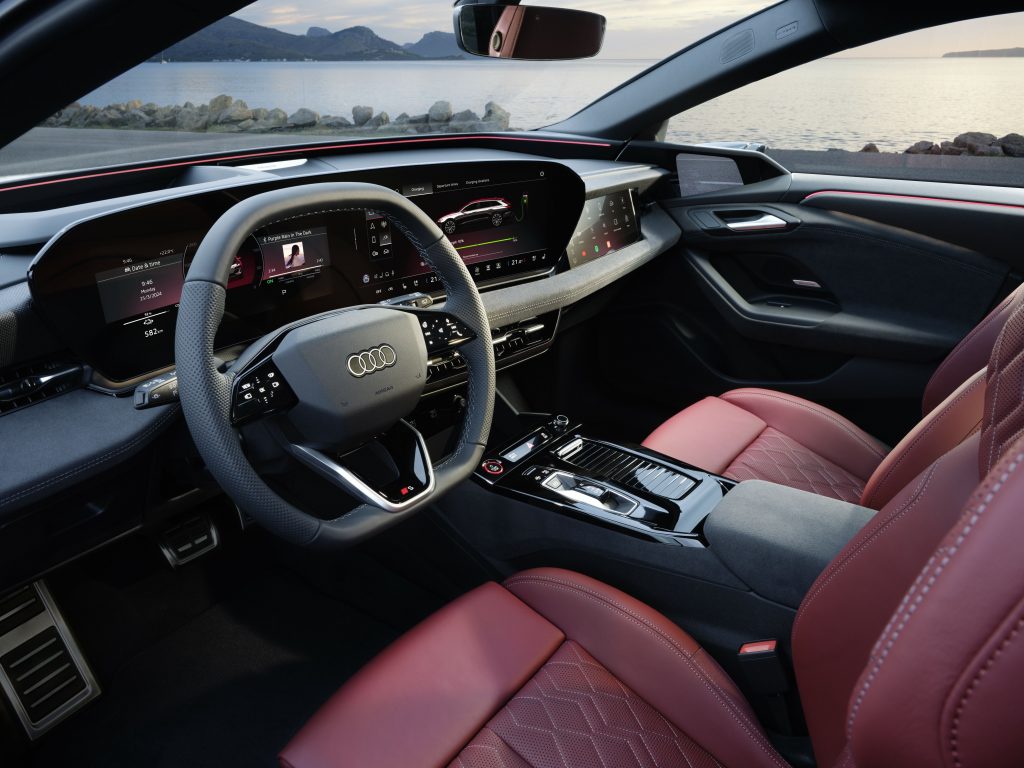
Audi MMI panoramic display and digital exterior mirrors
The interior of the Audi A6 e-tron is consistently geared towards the users’ needs. The three-dimensional and high-contrast design deliberately places elements in the foreground or background, creating a spatial architecture tailored to the occupants in terms of design and ergonomics. The MMI panoramic display, with its curved design and OLED technology, consists of the 11.9-inch Audi virtual cockpit and the 14.5-inch MMI touch display and, together with the 10.9-inch MMI front passenger display, forms a digital stage with visually clear design.
Active Privacy Mode allows the front seat passenger to enjoy entertainment content while traveling, such as watching movies or streaming series, without distracting the driver. Depending on the current speed, and seat occupancy, the light is directed (privacy mode on) or diffused (content visible to all) via an intelligent control unit.
Audi is taking a significant step forward in display technology with the optional second-generation augmented reality head-up display (AR HuD), another central element of the digital stage.
The display reflects a large, tilted image plane across the windshield towards the driver. It shows relevant information such as speed, traffic signs, assistance, and navigation symbols.
The interior creates a homely ambiance. The “soft wrap” extends from door to door across the entire panel width, creating a homogeneous and enveloping feeling of space. The materials were selected from a functional perspective. At the same time, they ensure a clear design differentiation of the various areas in the vehicle’s interior. Comfort-oriented areas are designed with generous surfaces and soft materials. In contrast, the precisely designed control areas in high-quality, high-gloss black emphasise the clarity of interaction with the vehicle. The low-lying, slim air vents seem to disappear into the background. The displays of the optional virtual exterior mirrors are located inside the doors, clearly visible in the angle of the A-pillar and the door sill.
A digital wrap is also created here, which extends from mirror to mirror across the entire digital instrument panel and is connected via the dynamic interaction light at the base of the windshield. Essential functions such as mirror adjustment, lighting, and locking systems are integrated compactly into the central control panel in the driver’s door. An optional four-zone automatic air conditioning system and the air quality package with aroma fragrance and ionizer complete the elegant ambiance.
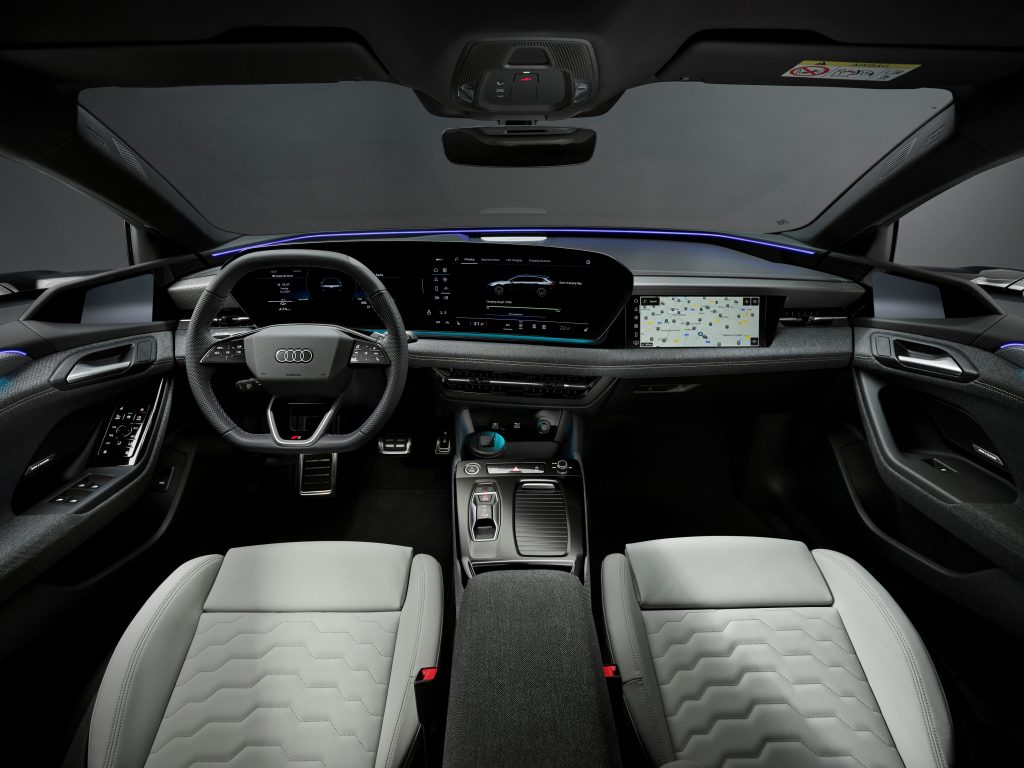
A smart panoramic glass roof with switchable transparency
An optional innovative panoramic glass roof further enhances the vehicles. In contrast to previous types, the panoramic roof’s smart glass minimises direct sunlight and becomes opaque at the touch of a button. This works with PDLC technology (polymer-dispersed liquid crystal), which can switch from transparent to opaque. Electrically switchable glass components contain two PDLC film elements, between which the liquid crystals giving them their name float. If no voltage is applied, the crystals form an opaque layer, making the glass roof non-transparent. If voltage is applied, the crystals align so the roof becomes transparent. It can be individually controlled like a “digital curtain” via a button in the roof module; customers can choose from four presets.
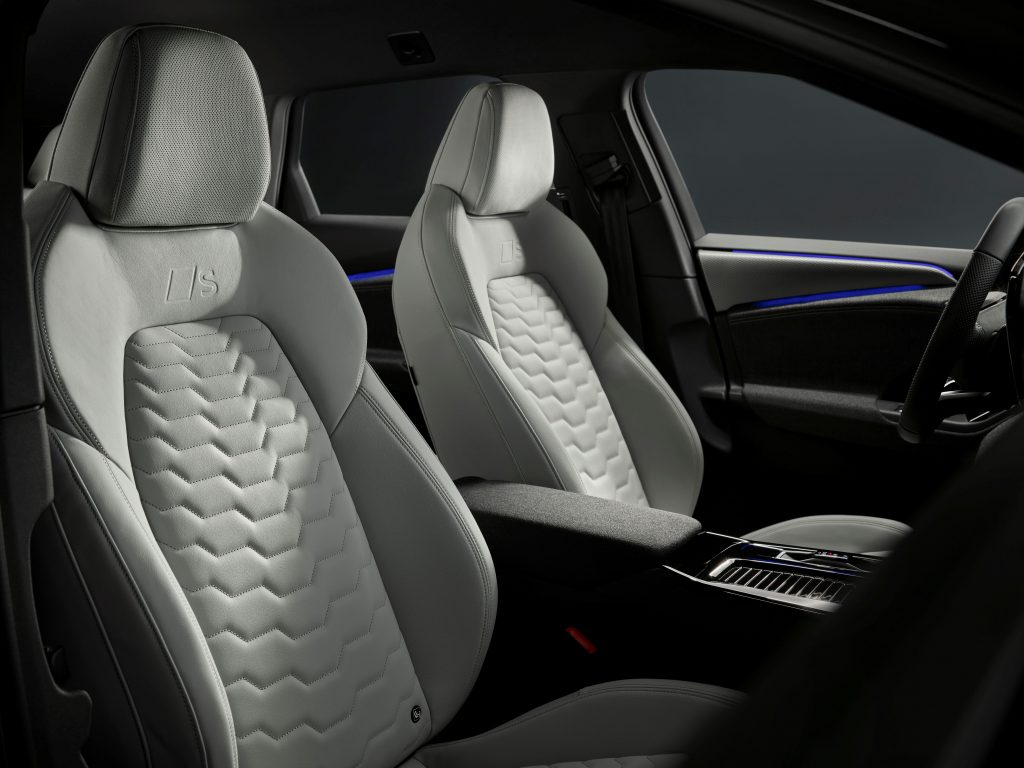
Infotainment – integrating the digital world of customers
The infotainment system uses Android Automotive OS as its operating system. The A6 e-tron updates its content via over-the-air updates. Therefore, the latest Audi connect services and the enhanced e-tron route planner, which comes as standard, are always up to date. Apps such as YouTube are available via the Audi Application Store for third-party apps, which is integrated directly into the MMI and does not require a smartphone to use.
The store gives customers access to a wide range of apps. At the A6 e-tron launch, various applications will be available from categories including: Music, Video, Gaming, Navigation, Parking and Charging, Productivity, Weather, and News Services. The store is constantly expanding, and the app portfolio is market specific.
In addition to the improved and more intuitive touch operation, the new display and operating concept addresses global trends toward interaction. For example, voice control has been significantly expanded and now plays a key role. The vehicle’s self-learning voice assistant, the Audi assistant, can control numerous vehicle functions.
In the future, the Audi assistant will also have access to additional online content, such as weather and general knowledge. Via a connection to ChatGPT (provided via Microsoft Azure OpenAI Service) customers can interact with their car using natural language and listen to the information they would like to know while driving.
The Audi assistant automatically recognises whether to execute a vehicle function, search for a destination, or, for example, provide the weather forecast. The Audi system only forwards queries to ChatGPT when it cannot answer general knowledge questions. Drivers enjoy a seamless experience as all the functions are integrated into the Audi assistant. Data security is the highest priority; to ensure optimal privacy, all questions and answers are deleted after processing. Moreover, ChatGPT never has access to vehicle data.
The Bang & Olufsen Premium Sound System with headrest loudspeakers ensures optimum sound. A highly efficient amplifier drives 20 loudspeakers with 830 watts of power. Four of these are integrated into the front seat headrests, enabling Audi to provide personal surround sound, personal navigation announcements, and one-on-one phone calls. Additional loudspeakers in the A-pillar and mid-range speakers create an incomparable 3D surround sound. The dynamic interaction light offers a variety of communication functions, supporting the vehicle’s interaction with the occupants. It spans the interior and cockpit below the windshield in the shape of a generous arc.
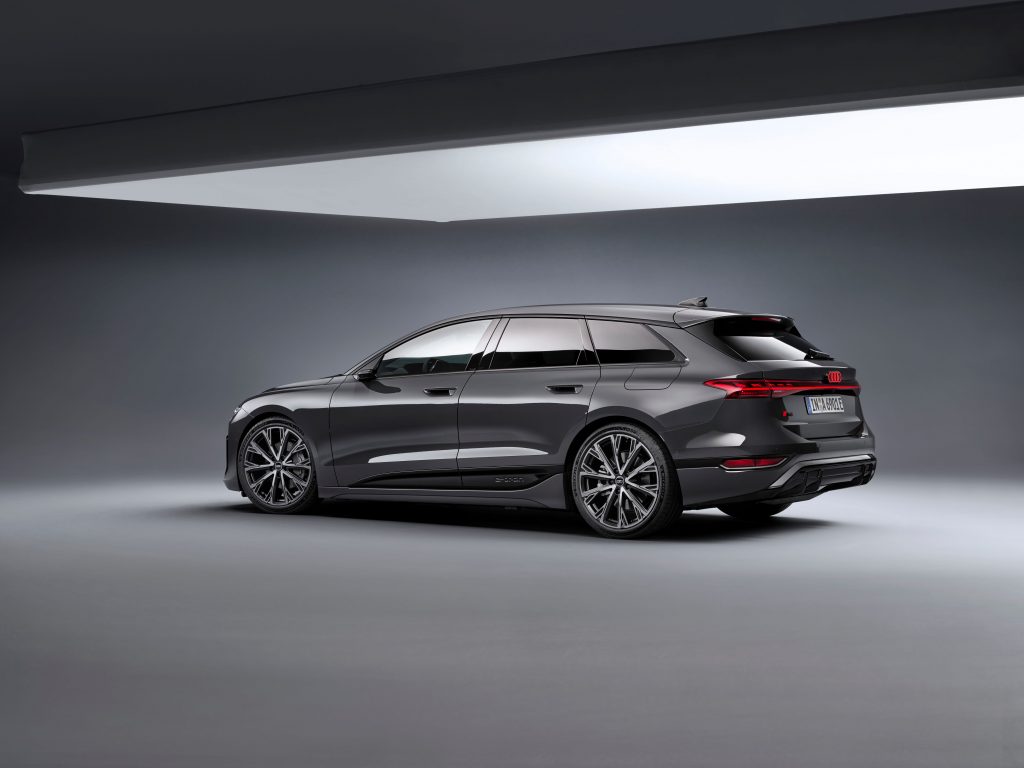
Impressive range and charging performance
Powerful, compact, and highly efficient electric motors and a lithium-ion battery newly developed for the PPE consisting of twelve modules and 180 prismatic cells with a total gross capacity of 100kWh (94.9kWh net) ensure a range of over 756 kilometres (A6 Sportback e-tron) and over 720 kilometres (A6 Avant e-tron). With a system output of up to 270kW in the A6 Sportback/Avant e-tron performance (power consumption in kWh/100 km combined: 17.0-14.0; CO2 emissions in g/km combined: 0; CO2 class: A), the new Audi A6 e-tron provides the sporty driving experience Audi is known for. The Audi A6 e-tron performance (power consumption in kWh/100 km combined: 17.0-14.0; CO2 emissions in g/km combined: 0; CO2 class: A) accelerates from zero to 100 km/h in 5.4 seconds. Its top speed is 210 km/h. The S6 e-tron provides a system output of 370kW (405kW with launch control) (power consumption in kWh/100 km combined: 17.4-15.7; CO2 emissions in g/km combined: 0; CO2 class: A).
The S6 Sportback e-tron and the S6 Avant e-tron accelerate from 0 to 100 km/h in 3.9 seconds (power consumption in kWh/100 km combined: 17.4-15.7; CO2 emissions in g/km combined: 0; CO2 class: A). The top speed is 240km/h. Its range is over 675 kilometres (S6 Sportback e-tron) and over 647 kilometres (S6 Avant e-tron.
The A6 e-tron performance (270 kW) with rear-wheel drive and the S6 e-tron (370kW) with quattro all-wheel drive, both as Sportback and Avant, will be available on launch. Depending on the market, further models with rear-wheel drive or quattro all-wheel drive will follow at a later date.
Thanks to 800-volt technology and a maximum DC charging capacity of 270kW as standard, short charging stops are possible with the Audi A6 e-tron. This means the A6 Sportback e-tron performance can be recharged at an appropriate charging station (High Power Charging, HPC) for a range of up to 310 kilometres in just ten minutes. The State of Charge (SoC) increases from 10 to 80 percent in 21 minutes. Intelligent high-performance and predictive thermal management are key components of this impressive charging performance. Equipped with Plug & Charge, the vehicle authorises itself at compatible charging stations when the charging cable is plugged in and activates the charging process. The charging process is fully automatic. If a charging station works with 400-volt technology, the Audi A6 e-tron can use bank charging. To enable this, the 800-volt battery is split into two banks, each with a voltage of 400 volts, which can then be charged in parallel with up to 135kW. AC charging with up to 11kW is possible at standard home chargers. A 22kW AC charging option will be offered later.
The advanced recuperation (regenerative braking) system is an important component in increasing the efficiency and range of the Audi A6 e-tron. This system can handle around 95 percent of everyday braking processes. The Audi A6 e-tron recuperates up to 220kW. The temperature and the battery’s state of charge play a key role here. Recuperation occurs on the front and rear axles, with minor deceleration handled by the rear axle for efficiency reasons. In addition, a higher regenerative braking performance is possible on the rear axle due to the more powerful electric motor.
The integrated Brake System (iBS) that is familiar in previous e-tron models has been enhanced significantly as part of the Premium Platform Electric. For the first time, the described axle-specific brake blending between the mechanical friction brake and regenerative braking via the electric motors is possible.
As is typical for Audi, the Audi A6 e-tron also offers the option of two-stage recuperation, which can be adjusted using the paddles on the steering wheel. Coasting is also possible. Here, the vehicle rolls without additional drag when the driver takes their foot off the accelerator pedal. Another variant of the A6 e-tron is the “B” driving mode, which comes close to what is colloquially called the “one-pedal feeling”. This mode offers the strongest recuperation deceleration. With an anticipatory driving style, almost all deceleration can be managed without pressing the brake pedal in driving mode “B”.
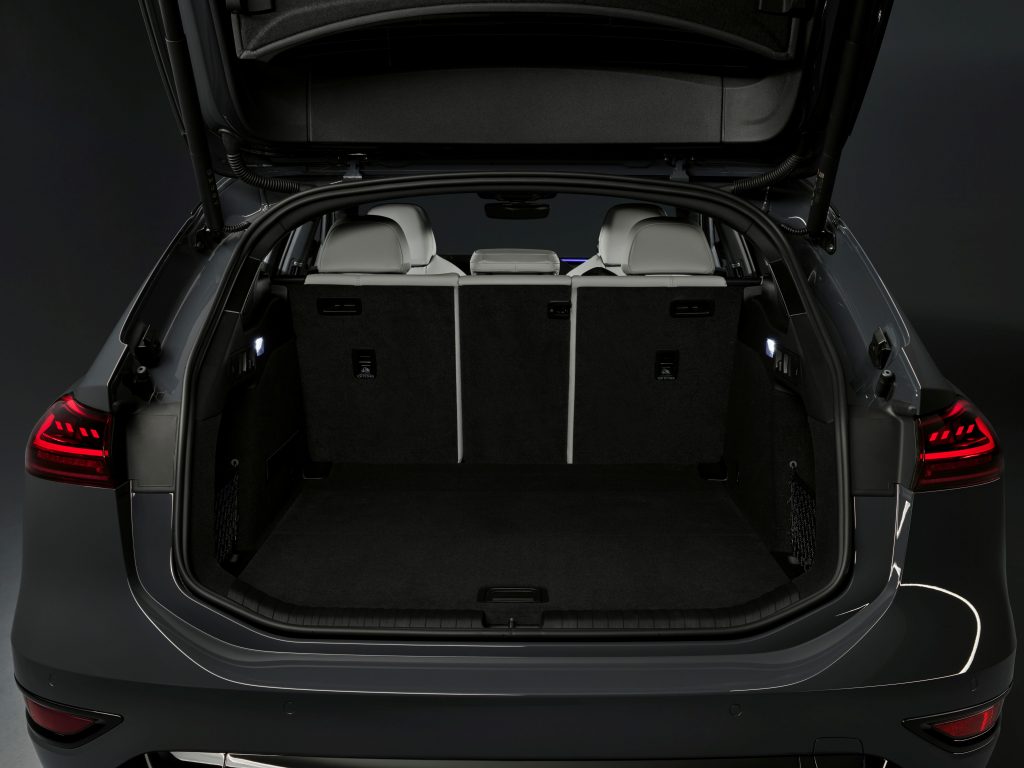
Precise driving dynamics, high comfort
The typical Audi DNA is also evident in the suspension. Here, there is a precisely defined set-up philosophy, and the suspension control systems are accurately coordinated with each other. The directly tuned front axle significantly influences the driving dynamics of the A6 e-tron, making the vehicle feel particularly agile.
The optional adaptive air suspension – an air suspension system with controlled damping – lends the vehicle a broad spread between high ride comfort and sporty handling. Depending on the speed and individual preferences, it adapts to specific road conditions and regulates the body’s ride height at four different levels. The efficiency mode in Audi drive select is a special feature. In efficiency mode, the suspension lowers the body by 20 millimetres depending on the speed, thus improving the vehicle’s aerodynamics. This serves to optimise energy consumption and increase range.
The rear-biased all-wheel drive system in the Audi S6 e-tron enhances the driving dynamics with a highly variable torque distribution. The different dimensions of the electric motors on the rear and front axles enable rear-biased torque distribution even under full load. The Audi S6 e-tron and A6 e-tron are equipped with differently sized tires on the front and rear axles, further improving stability and sportiness.
Always ready to assist: the driver assistance systems
With the A6 e-tron driver assistance systems, Audi provides a wide range of functions that make everyday life easier and significantly increase road safety for all road users.
The adaptive driving assistant plus is a new feature of the A6 e-tron. It supports the driver when accelerating, braking, maintaining speed and the set distance, and with lane guidance. This can increase driving comfort, especially on long journeys. In addition to various sensors, depending on the region, the system uses high-resolution map data and swarm data from other vehicles aggregated in the cloud to improve driving behaviour. Applying this fusion of information, the vehicle calculates the route ahead to enable a comfortable driving experience across the entire speed range and in traffic jams.
Park assist plus, a reversing camera, the traffic sign-based speed limiter, camera-based traffic sign recognition, adaptive cruise control, park assist plus with distance display, and distraction and drowsiness warning will come as standard at market launch.
